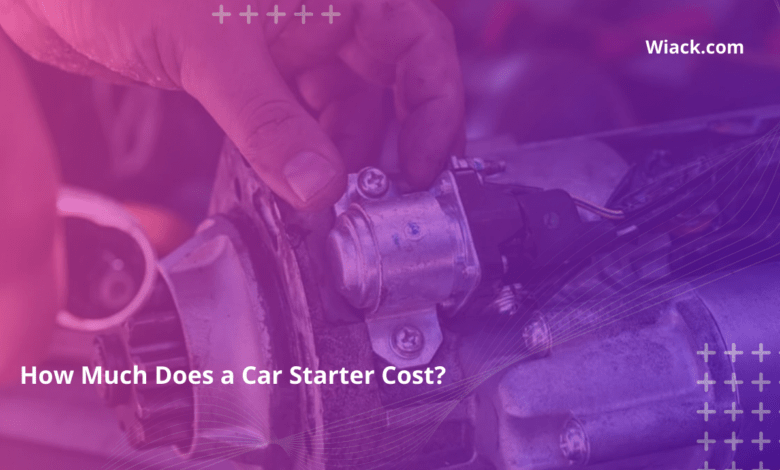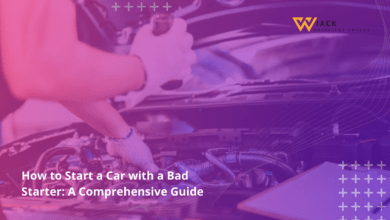How Much Does a Car Starter Cost?

Did you know that a car starter typically lasts for about 80,000 starts? That’s equivalent to starting your car twice a day for over 100 years! However, when a starter does fail, it can leave you stranded and facing an unexpected repair bill. In this comprehensive guide, we’ll explore the factors that influence car starter costs and provide you with the information you need to make an informed decision about your vehicle’s starter replacement.
Understanding Car Starters
What is a Car Starter?
A car starter is a crucial component of your vehicle’s electrical system. It’s responsible for initiating the engine’s operation when you turn the key or push the start button. The starter consists of a powerful electric motor that engages with the engine’s flywheel to turn the crankshaft, starting the combustion process.
The main components of a car starter include:
- Electric motor
- Solenoid (an electromagnetic switch)
- Pinion gear
- Drive assembly
When you start your car, the starter motor receives a high current from the battery, causing the pinion gear to extend and engage with the engine’s flywheel. This action turns the engine over, allowing it to begin the combustion process and run on its own power.
Types of Car Starters
There are several types of car starters available, each with its own advantages and price points:
- Direct-drive starters: These are the most common type found in modern vehicles. They’re compact, efficient, and relatively inexpensive.
- Gear reduction starters: These starters use a series of gears to increase torque, making them ideal for larger engines or cold-weather starting.
- Permanent magnet starters: These use permanent magnets instead of field windings, resulting in a lighter and more efficient starter.
- Pneumatic starters: Primarily used in large diesel engines, these starters use compressed air to turn the engine over.
- Hydraulic starters: Similar to pneumatic starters, these use hydraulic pressure and are often found in heavy-duty vehicles.
Understanding the type of starter your vehicle uses can help you estimate potential replacement costs more accurately.
Common Starter Problems
Before we dive into the costs associated with car starter replacement, it’s important to recognize the signs of a failing starter. Common symptoms include:
- Clicking sound when turning the key
- Slow cranking
- Intermittent starting issues
- Grinding noise during startup
- Starter continues running after engine starts
- Smoke coming from the starter area
If you’re experiencing any of these issues, it’s crucial to have your starter checked by a professional mechanic. Ignoring these symptoms can lead to more extensive damage and higher repair costs down the line.
Factors Affecting Starter Cost
Several factors influence the cost of a car starter replacement. Understanding these can help you better estimate the potential expense and make informed decisions about your vehicle’s maintenance.
Make and Model of Your Car
The make and model of your vehicle play a significant role in determining the cost of a starter replacement. Luxury and high-performance vehicles often require more expensive, specialized starters. For example:
- A starter for a Toyota Corolla might cost $80-$150
- A starter for a BMW 7 Series could cost $300-$500 or more
Additionally, some vehicles have starters that are more difficult to access, which can increase labor costs for replacement.
Year of Manufacture
The age of your vehicle can also impact starter costs. Older models might use less expensive, simpler starters, but they may be harder to find. Conversely, newer vehicles often have more complex, integrated starting systems that can be more expensive to replace.
For instance:
- A starter for a 2000 Honda Civic might cost $50-$100
- A starter for a 2022 Honda Civic could cost $150-$250
Location and Labor Costs
The cost of labor can vary significantly depending on your location and the type of repair shop you choose. Here’s a general breakdown:
- Independent mechanic: $70-$100 per hour
- Dealership: $100-$150 per hour
- Chain auto repair shop: $80-$120 per hour
Urban areas typically have higher labor rates compared to rural locations. For example, a starter replacement in New York City might cost $200-$300 in labor alone, while the same job in a small Midwestern town could be $100-$150.
Starter Brand and Quality
The brand and quality of the starter you choose will significantly impact the overall cost. There are three main categories:
- OEM (Original Equipment Manufacturer): These are the same starters that came with your vehicle when it was new. They’re typically the most expensive option but offer the best fit and reliability.
- Aftermarket: These are starters made by third-party manufacturers. They can range from budget options to high-performance upgrades. Prices vary widely, but they’re generally less expensive than OEM parts.
- Remanufactured: These are used starters that have been rebuilt to meet OEM specifications. They offer a balance between cost and quality.
Here’s a general price comparison:
| Starter Type | Price Range |
|---|---|
| OEM | $150-$400 |
| Aftermarket | $70-$300 |
| Remanufactured | $100-$250 |
Complexity of Installation
Some vehicles have starters that are easily accessible, while others require significant disassembly to reach the starter. The complexity of installation can greatly affect labor costs. For example:
- A starter replacement on a Honda Civic might take 1-2 hours
- The same job on a Audi A4 could take 3-4 hours due to the need to remove other components to access the starter
Always ask your mechanic for an estimate of labor hours before agreeing to the repair.
Typical Starter Costs
Now that we’ve covered the factors that influence car starter costs, let’s look at some typical price ranges you might encounter.
Average Starter Cost
On average, you can expect to pay between $200 and $500 for a car starter replacement. This includes both parts and labor. However, keep in mind that this is a broad average, and your actual costs could fall outside this range depending on the factors we’ve discussed.
Cost Range for Different Vehicles
Here’s a breakdown of starter replacement costs for some popular vehicle types:
- Compact Cars (e.g., Honda Civic, Toyota Corolla)
- Parts: $80-$200
- Labor: $100-$200
- Total: $180-$400
- Midsize Sedans (e.g., Honda Accord, Toyota Camry)
- Parts: $100-$250
- Labor: $150-$250
- Total: $250-$500
- Luxury Vehicles (e.g., BMW 3 Series, Mercedes C-Class)
- Parts: $200-$500
- Labor: $200-$400
- Total: $400-$900
- Trucks and SUVs (e.g., Ford F-150, Chevrolet Tahoe)
- Parts: $150-$350
- Labor: $200-$300
- Total: $350-$650
Remember, these are estimates, and your actual costs may vary based on your specific vehicle and location.
Labor Costs for Installation
Labor costs can make up a significant portion of your total car starter replacement expense. The time required for installation can range from 1 to 4 hours, depending on the vehicle. Here’s a general breakdown of labor costs:
- 1 hour of labor: $70-$150
- 2 hours of labor: $140-$300
- 3 hours of labor: $210-$450
- 4 hours of labor: $280-$600
Always ask for a detailed breakdown of labor costs when getting quotes for starter replacement.
Additional Costs
When budgeting for a car starter replacement, be aware of potential additional costs:
- Diagnostic fees: Some shops charge a fee to diagnose the problem, which can range from $50 to $100.
- Electrical system inspection: Your mechanic might recommend checking the entire starting system, including the battery and alternator, which could add $50-$100 to the bill.
- Flywheel repair: If the starter has been malfunctioning for a while, it may have damaged the flywheel. Repairing or replacing the flywheel can cost an additional $300-$800.
- Wiring repairs: Sometimes, faulty wiring is the root cause of starter problems. Repairing or replacing wiring can add $100-$300 to the total cost.
Always ask your mechanic about any potential additional costs before authorizing the repair.
Finding the Right Starter
When it comes to replacing your car starter, finding the right part at the best price is crucial. Here are some strategies to help you make an informed decision.
Researching Starter Prices Online
The internet is a valuable resource for researching car starter prices. Here are some steps to follow:
- Visit auto parts websites like AutoZone, Advance Auto Parts, or RockAuto.
- Enter your vehicle’s make, model, and year to find compatible starters.
- Compare prices across different brands and qualities (OEM, aftermarket, remanufactured).
- Read customer reviews to gauge the quality and reliability of different starters.
- Check for any available online discounts or promotions.
Remember to factor in shipping costs if you’re planning to order online. Some sites offer free shipping for orders over a certain amount, which could save you money.
Consulting Local Auto Parts Stores
Local auto parts stores can be a great resource for finding the right car starter. Benefits of visiting a local store include:
- Immediate availability of parts
- Expert advice from store staff
- Ability to physically inspect the starter before purchase
- Potential for price matching with online retailers
- Easy returns if the part doesn’t fit or work correctly
When visiting a local store, bring your vehicle’s make, model, and year information. Some stores can even look up your vehicle’s specific needs using your VIN (Vehicle Identification Number).
Getting Quotes from Mechanics
Professional mechanics can provide valuable insights into the best car starter for your vehicle. Here’s how to get the most out of mechanic quotes:
- Contact at least three reputable mechanics or auto repair shops in your area.
- Provide them with your vehicle’s details and explain the symptoms you’re experiencing.
- Ask for a breakdown of costs, including parts, labor, and any potential additional fees.
- Inquire about the brand and type of starter they recommend and why.
- Ask about any warranties on parts and labor.
Don’t be afraid to ask questions about the recommended starter and the replacement process. A good mechanic will be happy to explain their recommendations and help you understand the repair process.
Tips for Saving Money
Replacing a car starter can be expensive, but there are ways to reduce costs without compromising on quality. Here are some money-saving tips to consider.
DIY Starter Replacement
If you’re mechanically inclined, replacing the starter yourself can save you a significant amount on labor costs. Here’s a general overview of the process:
- Disconnect the battery
- Locate the starter (usually near the bottom of the engine)
- Remove any components blocking access to the starter
- Disconnect the electrical connections to the starter
- Remove the mounting bolts and take out the old starter
- Install the new starter and reconnect everything
- Test the new starter
However, keep in mind that this can be a complex job, especially if you’re not experienced with car repairs. If you’re unsure, it’s best to leave it to the professionals to avoid potentially costly mistakes.
Choosing a Used Starter
A used car starter can be a cost-effective option, but it comes with risks. If you decide to go this route:
- Only buy from reputable sellers with good return policies
- Check that the starter is compatible with your specific vehicle
- Ask about the starter’s history and why it was removed from the original vehicle
- Look for signs of wear or damage
- Consider having a mechanic inspect the used starter before installation
While a used starter can save you money upfront, it may not last as long as a new or remanufactured unit. Weigh the potential savings against the risk of needing another replacement sooner.
Negotiating with Mechanics
Don’t be afraid to negotiate with mechanics for a better price on your car starter replacement. Here are some tips:
- Get multiple quotes and use them as leverage
- Ask if there are any current promotions or discounts available
- Inquire about using aftermarket or remanufactured parts to reduce costs
- See if you can provide your own parts to save on markup
- Ask about a cash discount (some shops offer this to avoid credit card fees)
Remember to be respectful and reasonable in your negotiations. Building a good relationship with a mechanic can lead to better service and potential discounts in the future.
Checking for Discounts and Rebates
Before making a purchase, check for available discounts and rebates on car starters:
- Look for manufacturer rebates on OEM parts
- Check for seasonal sales at auto parts stores
- See if your auto insurance offers any discounts for vehicle repairs
- Look into loyalty programs at auto parts stores or repair shops
- Check if you qualify for any professional or membership discounts (e.g., AAA, military, senior citizen)
Even small discounts can add up, so it’s worth taking the time to search for potential savings.
Conclusion
Summary of Starter Costs
To recap, the cost of a car starter replacement can vary widely, typically ranging from $200 to $500. This includes both parts and labor. However, luxury vehicles or complex installations can push costs up to $900 or more. The final price depends on factors such as:
- Your vehicle’s make, model, and year
- The type and brand of starter you choose
- Labor costs in your area
- Any additional repairs needed
Always get multiple quotes and consider all your options before making a decision.
Importance of a Working Starter
A functioning starter is crucial for your vehicle’s operation. Without it, you’ll be left with a car that won’t start, potentially leaving you stranded or disrupting your daily routine. Regular maintenance and prompt attention to any starting issues can help prevent unexpected breakdowns and extend the life of your starter.
Getting Your Car Started Again
Whether you choose to replace your car starter yourself or have a professional do it, the most important thing is getting your vehicle back on the road safely and reliably. Don’t hesitate to ask questions, do your research, and make an informed decision based on your specific needs and budget.
Remember, while cost is an important factor, it shouldn’t be the only consideration. Choosing a quality starter and ensuring proper installation can save you money and headaches in the long run. With the information provided in this guide, you’re now well-equipped to navigate the process of car starter replacement and make the best choice for your vehicle and your wallet.
Get the latest car news, reviews, and prices at Wiack.com. Your one-stop destination for all things automotive.





